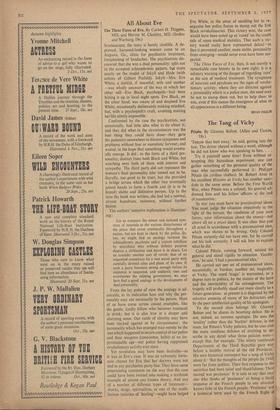All About Eve
SUMMARISED, the story is barely credible. A de- pressed, harassed-looking woman came to an Augusta, Ga., clinic for psychiatric treatment, Complaining of headaches. The psychiatrists dis- covered that she was a dual personality; split not in the accepted schizophrenic pattern, but more nearly on the model of Jekyll and Hyde (with echoes of Gilbert Pinfold). Jekyll—Mrs. Eve White, a dutiful, if resentful, wife and mother —was wholly unaware of the way in which her other self—Eve Black, psychopath—had been hitting it up in local night spots. Eve Black, on the other hand, was aware of and despised Eve White, occasionally deliberately making mischief, but, with a psychopath's craft, avoiding making her life utterly impossible.
Confronted by the case the psychiatrists; not unnaturally, had little idea what to do about it; and they did what in the circumstances was the best thing they could have done—they gave the patient(s) somewhere to discuss symptoms and problems without fear or moralistic fervour;, and waited, in the hope that something would eventu- ally emerge. It did : in the form of a third per- sonality, distinct from both Black and White, but watching over both of them with interest and sympathy. The third party did not represent the woman's final personality (she turned out to be, literally, too good to be true), but she provided a bridge across which the other two eventually joined hands to form a fourth and (it is to be hoped) stable and definitive person. Up to the time the book was written, she had led a normal, almost humdrum, existence, without further fission.
The authors' tentative explanation is illuminat- ing : Let us compare the minor and isolated sym- toms of neurosis to the various disturbances of the peace that occur continually throughout a nation, but are kept in check by the police. So, too, we might find an analogy between the schizophrenic psychosis and a violent rebellion by anarchists who without definite purpose destroy a civilisation and leave it in chaos. Let us consider another sort of revolt, that of an organised conspiracy by a vast secret party with carefully devised aims and plans of its own. If such a party becomes strong enough before its existence is suspected, and suddenly rises and overthrows the existing government, we may here find a good analogy to the development of dual personality.
From the lay point of view the analogy is ad- mirable, in its indication how and why the per- sonality may not necessarily be the person. Most of us have come across casual examples, like the gentle, kindly fellow who becomes maniacal in drink; but it is also true in a deeper and alarming sense. Our cards of identity may have been stacked against us by circumstance : the personality which has emerged may merely be the one which happened to secure control of our police and their weapons (conscience, habit) at an im- pressionable age—our police having suppressed revolutionary activity ever since.
Yet revolution may have been desirable—as it was in Eve's case. It was an extremely fortu- nate chance for Eve that her doctors were not tied to any psychiatric party line. They have some entertaining comments on the way that the case could have been twisted into making a textbook example of almost any known theory. And any of a number of different types of treatment— shocks, drugs. spirituMism, or one of the multi- farious varieties of 'healing'—might have helped Eve White, in the sense of enabling her to re- organise her police forces to stamp out the Eve Black revolutionaries. This victory won, the case would have been noted up as 'cured' on the credit side of some medical statistics. That such a vic- tory would really have represented defeat—in that it prevented another, more stable, personality from emerging—would never even have been sus- pected.
The Three Faces of Eve, then, is not merely a remarkable case history in its own right; it is a salutary warning of the danger of regarding 'cure' as the aim of medical treatment. The symptoms of neurosis and psychosis are the signs of revolu- tionary activity; where they are directed against a personality which is a police state, the need may be not to stamp them out, but to help them to win, even if this means the emergence of what to all appearances is a different being.
BRIAN INGLIS
































 Previous page
Previous page